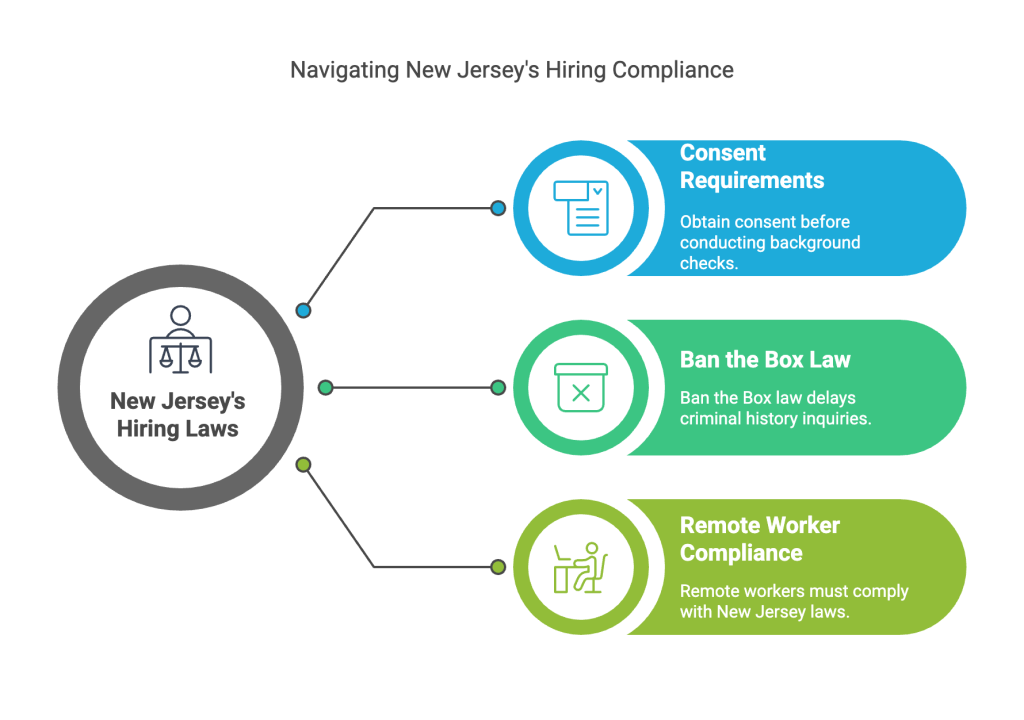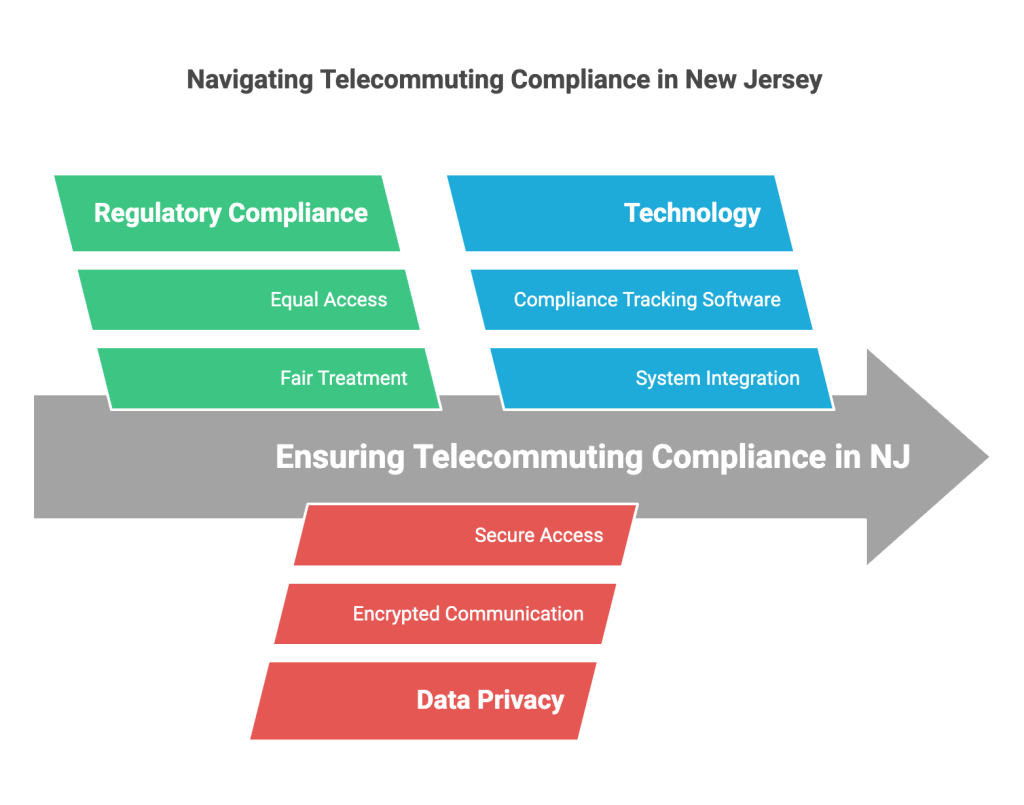The world of work has undergone a seismic shift, with more employees logging in from their homes than ever before. Remote work isn't just a temporary solution; it's a new way of life. For companies in New Jersey, ensuring proper background checks for remote employees—both in-state and out-of-state—has become a critical component of workforce management. This guide dives into the complexities of "New Jersey remote work background checks" and "NJ out-of-state employee screening," providing a roadmap for telecommuting compliance in NJ.
We'll explore the laws, best practices, and practical steps necessary to maintain compliance and keep your company secure in this new era of work.
Key Takeaways
- Remote work doesn't diminish the need for background checks, which remain crucial for verifying qualifications and maintaining trust.
- Compliance with New Jersey's background check laws includes obtaining consent and adhering to the "Ban the Box" regulation.
- Hiring out-of-state remote workers requires understanding each state's unique background check requirements to avoid legal issues.
- Telecommuting compliance involves structuring remote work arrangements fairly and safeguarding employee data with secure technology.
- Consistent background check policies are essential for ensuring fairness and legality when managing a dispersed remote workforce.
Introduction
Remote work has surged, reshaping employment practices. Companies across the United States are adapting to this new norm, and New Jersey is no exception. As employees trade office desks for home offices, the importance of background checks remains undiminished. They ensure that you're hiring reliable team members, even when face-to-face meetings are rare.
Why do these checks still matter? Remote work doesn't change the fundamental need to verify qualifications, check for criminal records, or confirm previous employment. It's about trust and safety, and these aren't negotiable just because your new hire logs in from a kitchen counter.
This guide focuses on remote work compliance in New Jersey, a state known for strict regulations. You'll learn what it takes to manage background checks for in-state and remote out-of-state workers. Whether you're a New Jersey-based company or hiring nationwide, understanding these legalities is crucial for protecting your organization's interests.
Understanding New Jersey's Background Check Laws
New Jersey's background check laws come with their own set of rules. If you're hiring, you need to know these in order to stay compliant. One major requirement is obtaining an applicant's consent before conducting a background check. The consent form should clearly state what checks will be performed and how the information will be used. It's essential to provide a standalone disclosure––don't bundle it with other hiring documents.
Another key aspect is the "Ban the Box" law. This regulation prevents employers from asking about a candidate's criminal history on the initial job application. It helps ensure that candidates are judged purely on their qualifications first, rather than their past criminal record. This law impacts when and how you can ask about criminal backgrounds, especially in the early stages of hiring.

Remote workers in New Jersey aren't exempt from these regulations. Whether they're working at home or on-site, the same rules apply. If your remote workforce includes residents of New Jersey, you must align with state laws for their screenings. This means respecting the consent and disclosure requirements and adhering to "Ban the Box" timelines. Navigating these demands demonstrates your commitment to fair hiring practices, no matter where your staff is located. Are your current practices in line with New Jersey's legal expectations? If not, now’s the time to adjust.
NJ Out-of-State Employee Screening
Employing remote workers across state lines comes with its set of hurdles, primarily due to varying background check laws. When you're hiring employees from different states, understanding each state's regulations is essential. Every state has its own rules about what information you can use, how you must notify candidates, and when you can conduct these checks.
For instance, some states require explicit consent from the candidate, while others regulate the types of criminal records you can access. California, for example, has stricter privacy laws compared to most other states. Ignoring these nuances could lead to non-compliance and potential legal problems.
How can you effectively navigate these challenges? Start by collaborating with a reputable screening provider experienced in multi-state compliance. They can help ensure your procedures meet both federal and state-specific requirements, reducing the risk of legal exposure. Regularly update your practices to align with evolving laws, as legislative changes can impact your compliance obligations quickly.
Think about whether your current procedures account for these variations in state laws. Is your strategy robust enough to handle diverse, location-specific requirements? By proactively managing these complexities, you maintain a seamless and compliant hiring process for your remote workforce.
The Role of Telecommuting Compliance in NJ
In the telecommuting landscape, understanding compliance isn't just about ticking boxes—it's about safeguarding your business and employees. New Jersey has regulations that could influence your remote work strategies. These laws dictate how telecommuting arrangements should be structured, emphasizing fair treatment and equal access to remote work opportunities.

Data privacy is a big concern. When employees work from home, sensitive information becomes more vulnerable. You need strong protocols to protect both employee and business data. Consider encrypted communication tools and secure access methods. Ensuring data security helps maintain employee trust and shields your company from potential breaches.
Technology plays a crucial role in compliance. Tools that track updates in state laws or automate parts of the compliance process can reduce administrative burdens. Use software that integrates seamlessly with your existing systems, providing alerts when changes in regulations occur. This proactive approach keeps your operations smooth and compliant despite the complexities of managing a remote workforce.
Best Practices for Conducting Remote Work Background Checks
Establishing a consistent policy is crucial. Every remote worker, whether they're in New Jersey or another state, should undergo the same background check process. This minimizes discrepancies and promotes transparency within your organization.
Partnering with third-party providers can streamline the background check process. These professionals have the expertise and tools to handle varied state regulations and help ensure you're not violating any local laws. They often provide a more efficient service than handling checks internally, especially if you have a diverse workforce spread across different jurisdictions.
Ensuring non-discrimination means applying the same standards and criteria for all candidates. This practice helps in maintaining fairness and protects your company from potential lawsuits. It's vital that factors not related to the job itself, such as age, race, or gender, don't influence decisions during the screening process.
By focusing on these best practices, you can build a stronger, legally compliant foundation for your remote workforce. Have you updated your background check policies to ensure consistency and non-discrimination in remote settings?
Special Considerations for Remote Work
Remote work presents unique challenges for background checks. You'll need to tweak traditional processes to fit a virtual environment. For instance, verifying a remote employee's educational credentials or previous work experience might require more reliance on digital documentation. This means embracing online credential verification services, which can be more efficient than their paper-based counterparts.
Consider continuous monitoring as part of your employee management strategy. With remote employees working miles away, it's crucial to maintain updated information. This helps address any new issues that might arise post-hire, keeping your workforce secure. Regular checks can flag changes in criminal records or credit histories that might impact their continued employment.
Fairness is key. When applying background checks, ensure they are consistent for all employees. This avoids legal pitfalls and promotes a fair workplace. Consider training your HR team on unconscious bias to ensure that every candidate is evaluated on the same criteria, regardless of location.
Think about these adjustments as steps toward building a solid remote workforce. How will you ensure your background checks are both thorough and fair in a scattered work environment?
Legal Support and Resources
Navigating the complexity of employment background checks is no small feat, especially when dealing with remote workers across various states. Partnering with legal experts can provide you with the necessary insights to ensure your practices are compliant with both New Jersey laws and those of other states where your employees reside. Legal professionals can help demystify the regulatory landscape, helping you avoid costly pitfalls and ensuring that your processes adhere to the latest legal standards.
To help you on this journey, there are numerous resources available. The "U.S. Department of Labor" is a valuable starting point for guidance on federal hiring practices. Regularly checking such resources can keep you updated on any changes in the laws affecting background checks, ensuring that your company remains ahead of the curve in compliance management.
Engaging with these tools and expertise equips you to build a robust and legally sound background check process. This proactive approach not only protects your company from legal challenges but also enhances the integrity of your hiring practices.
Conclusion
Adhering to New Jersey's specific laws and maintaining multi-state compliance isn't just about ticking boxes; it's about building a trustworthy and secure remote workforce. Staying informed on the legal landscape helps you avoid pitfalls that could cost time and money. Proactively managing your background checks means more than just compliance—it fosters trust with your staff and stakeholders.
Think of the potential impact on your business reputation if background checks are neglected. Are you ready to take that risk? Understanding and implementing robust processes keeps you ahead of legal shifts and ensures that remote work transitions smoothly. Preparedness and adaptability directly influence the success of your remote operations, securing your organization's place in the work-from-home future.
Further Reading and Resources
Exploring additional resources can offer insights into the intricacies of remote work background checks. Consider the following options to enhance your understanding and approach:
- Society for Human Resource Management (SHRM): Offers guidance on HR best practices and insights into state-specific compliance issues.
- National Association of Professional Background Screeners (NAPBS): Provides standards and best practices for background screening.
- LawHelp.org: Links to legal resources and information about employment laws in various states.
- U.S. Equal Employment Opportunity Commission (EEOC): Explore federal guidelines on non-discriminatory practices in hiring.
- American Bar Association - Labor and Employment Section: A source for legal perspectives on employment checks.
These resources are geared to inform and assist in navigating the challenges of implementing remote work background checks effectively. Leveraging the knowledge they offer can support your commitment to compliance and fair employment practices.
Frequently Asked Questions (FAQs)
Do NJ background checks apply to remote workers in other states?
Yes, NJ employers should consider conducting background checks for remote workers in other states. This helps ensure consistency and compliance with company policies, but be mindful of state-specific laws.
How to verify education for remote hires in NJ?
Request official transcripts directly from educational institutions or use third-party verification services to confirm credentials efficiently.
Can NJ employers require drug tests for remote workers?
Yes, employers can require drug tests for remote workers, but it’s important to comply with both NJ and the employee’s state laws regarding testing procedures.
Are NJ companies liable for other states’ laws?
Yes, when employing remote workers, NJ companies must adhere to the employment laws of the states where their employees reside.
How to handle county-specific checks for NJ remote hires?
Conduct county-specific criminal checks where the employee has lived, worked, or studied. Focus on counties relevant to the applicant's history.
Can remote workers sue NJ employers for FCRA violations?
Yes, remote workers can sue NJ employers for violating the Fair Credit Reporting Act (FCRA). Ensuring compliance with FCRA is crucial when performing background checks.
Do international remote workers fall under NJ laws?
International workers are generally subject to the laws of their home countries, but NJ laws may apply depending on specific contractual or employment arrangements.
Are gig workers considered remote employees in NJ?
Gig workers are typically considered independent contractors, not employees, so NJ employment laws might not apply unless specific conditions are met.
What’s the cost of multi-state checks for NJ employers?
Costs vary based on the number of states involved and the depth of the background checks. Consult with background check providers for accurate pricing.
Does NJ require I-9 verification for remote hires?
Yes, NJ requires I-9 verification for all hires, including remote workers, to confirm eligibility to work in the United States.
Can NJ companies verify remote workers' licenses?
Yes, verify licenses through the relevant state licensing boards to ensure compliance with industry standards.
Do remote workers need NJ worker’s compensation coverage?
If remote workers are performing their duties in NJ, they generally require coverage under NJ worker’s compensation laws.
How should NJ employers track remote workers’ work hours?
Utilize time tracking software suited to capture accurate work hours for remote staff to maintain transparency and compliance with labor laws.
Can confidentiality agreements apply to NJ remote workers?
Yes, enforce confidentiality agreements with remote workers to protect sensitive company information, ensuring these agreements comply with applicable laws.
Definitions
Background Check
A background check is a process employers use to verify details about a candidate before making a hiring decision. It may include checking criminal records, employment history, education, and references. For remote workers, this process often involves online tools and third-party providers to maintain consistency and compliance with state laws.
Ban the Box
"Ban the Box" refers to laws that stop employers from asking about a candidate’s criminal history on initial job applications. In New Jersey, you must wait until later in the hiring process to ask these questions. The goal is to reduce bias and give qualified applicants a fair chance to be considered based on skills and experience.
Consent Form
A consent form is a document candidates must sign before you conduct a background check. It outlines what information you’ll check and how you’ll use it. Under New Jersey law, this must be a standalone form—not part of a job application or other paperwork—to ensure transparency.
Telecommuting Compliance
Telecommuting compliance means following employer rules and legal requirements for remote work arrangements. In New Jersey, this includes handling data securely, treating remote employees fairly, and applying workplace policies consistently. It's about making sure your remote setups still meet labor laws and company standards.
Non-Discrimination
Non-discrimination in hiring means applying the same standards to all candidates, regardless of race, gender, age, or background. During background checks, this means not letting personal attributes unrelated to the job affect your decision. It promotes fairness and helps protect your business from legal issues.
Still have questions?
Get in touch with our team today for a personalized demo and discover how our tailored volume pricing and packages can drive results for your business!
How useful was this page?*
Note: your comments are anonymous. We use them to improve the website. Do not include any personal details.
Visit our FCRA Compliance Tool or leave a message here if you need a response.
From the blog Explore the GCheck Content Hub

Employment Credit Checks: 2026 Guide to Legal Compliance and Best Practices
7 Jan, 2026 • 27 min read
I-9 Form Management Systems: Modernizing Employment Eligibility Verification for 2026
6 Jan, 2026 • 19 min read
EEOC Compliance Requirements 2026: Complete Employer Guide to Fair Hiring Practices
29 Dec, 2025 • 24 min readThe information provided in this article is for general informational and educational purposes only and should not be construed as legal advice or a substitute for consultation with qualified legal counsel. While we strive to ensure accuracy, employment screening laws and regulations—including but not limited to the Fair Credit Reporting Act (FCRA), Equal Employment Opportunity Commission (EEOC) guidelines, state and local ban-the-box laws, industry-specific requirements, and other applicable federal, state, and local statutes—are subject to frequent changes, varying interpretations, and jurisdiction-specific applications that may affect their implementation in your organization. Employers and screening decision-makers are solely responsible for ensuring their background check policies, procedures, and practices comply with all applicable laws and regulations relevant to their specific industry, location, and circumstances. We strongly recommend consulting with qualified employment law attorneys and compliance professionals before making hiring, tenant screening, or other decisions based on background check information.

